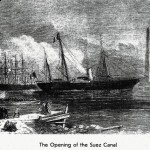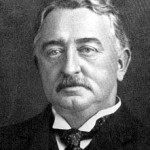British Interests in Egypt and the Sudan
Category: 19th century When the Suez Canal built by French engineers under Ferdinand Lesseps was opened in 1869, Egypt at once became the key to the most important waterway in the world. It was especially important for Britain, because the canal connecting the Mediterranean and Red Seas was on the main route to India. It cut the distance from England to India by 10,000 km. At the same time, the development of important cotton plantations in Egypt, to which a powerful impetus had been given by the American Civil War, was another reason for British interest in this region, since Britain was the chief importer of cotton and the plantations had been developed largely with British capital.
When the Suez Canal built by French engineers under Ferdinand Lesseps was opened in 1869, Egypt at once became the key to the most important waterway in the world. It was especially important for Britain, because the canal connecting the Mediterranean and Red Seas was on the main route to India. It cut the distance from England to India by 10,000 km. At the same time, the development of important cotton plantations in Egypt, to which a powerful impetus had been given by the American Civil War, was another reason for British interest in this region, since Britain was the chief importer of cotton and the plantations had been developed largely with British capital.
The government of Egypt began to introduce Western improvements in the sixties and seventies, and Egypt turned for the capital to London. Due to the British investments, in little more than ten years 900 miles of railways, hundreds of bridges, thousands of miles of canals and telegraphs, costly docks at Suez and Alexandria were built.
The operations proved almost boundlessly profitable to British bankers and industrialists. First of all loans had to be raised. Between 1864 and 1873 four great loans amounted to over £52,500,000, raised at heavy rates of interest. But Egypt received only £35,400,000, the rest going to the British financiers as commission. This was only the beginning since almost all the money raised was at once paid over to British contractors, who in their turn made vast profits. Thus, the harbour works at Alexandria, for which the Egyptian government paid £2,500,000, realized a profit of £1,100,000 for the contractors.
By 1875 the indebtedness of Egypt was so great that the government of the country was forced to sell its shares (nearly 50 per cent) in the Suez Canal to the British government. The population of Egypt was much displeased with that. A Nationalist Party, openly anti-foreign, began to gain support. In 1881 the Nationalists seized power and established a government determined to resist foreign encroachments.
Britain and France that also possessed almost half of the shares of the Suez Canal sent warships to Alexandria. There they organized a “massacre” of Christians, mostly Greeks and Armenians, by hired Bedouin assassins, as a pretext for intervention. By the end of September 1882 the British were in full military control of the whole country. For the next twenty-five years Egypt was ruled by Consul-General Sir Evelyn Baring (later Lord Cromer). The occupation of Egypt gave Britain control of the Suez Canal for the next 70 years. British interests in Egypt increased, and in 1914 Britain made Egypt a protectorate and kept troops there even after Egypt was given independence in 1952. Only under President Gamal Abdel Nasser, in 1956, Egypt took control of the Suez Canal.
Soon after the occupation of Egypt had been completed the British rule was extended to the Sudan.
The Sudan, stretching south from Egypt almost to the Equator, was important not only for its fertility and natural riches but because of the upper reaches of the Nile pass through it and whoever controls the Sudan also controls Egypt. Towards the end of the 19th century it became of special value to Britain as a link in the chain of territory which it was hoped would extend right across Africa from Cairo to the Cape.
 The British South Africa Company was formed in 1889 for the development of Rhodesia, and in a few years British Africa was expanded as far north as Nyasaland and the shores of Lake Tanganyika. At the same time the British were pressing south the Sudan, and the Cape-Cairo scheme, which Cecil Rhodes, the prime minister of the Cape Colony, proposed to complete with a railway, seemed within measurable distance of accomplishment.
The British South Africa Company was formed in 1889 for the development of Rhodesia, and in a few years British Africa was expanded as far north as Nyasaland and the shores of Lake Tanganyika. At the same time the British were pressing south the Sudan, and the Cape-Cairo scheme, which Cecil Rhodes, the prime minister of the Cape Colony, proposed to complete with a railway, seemed within measurable distance of accomplishment.
